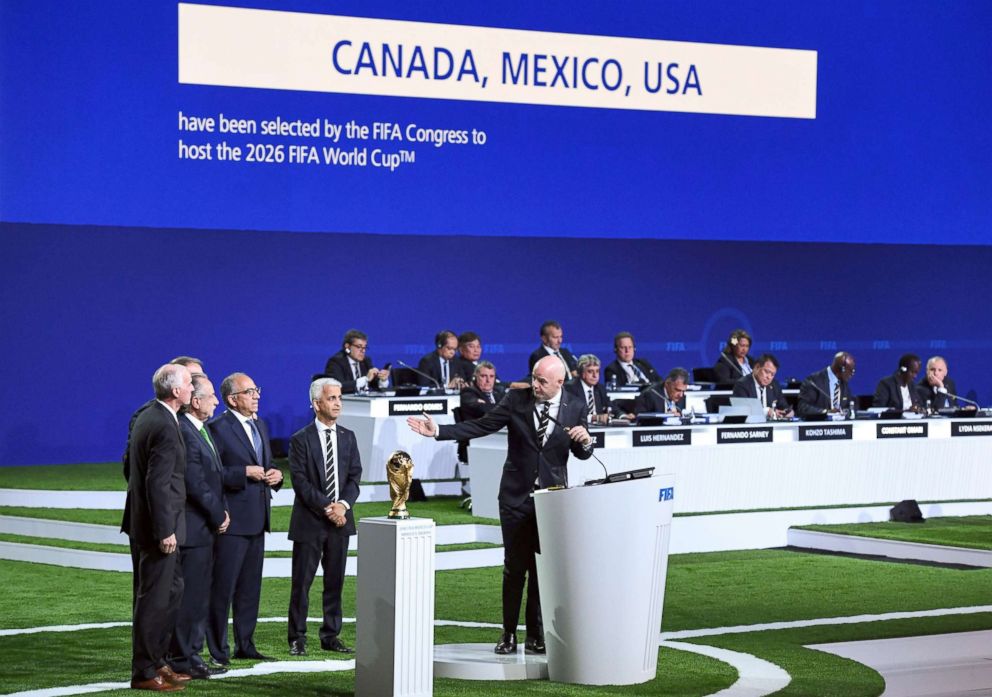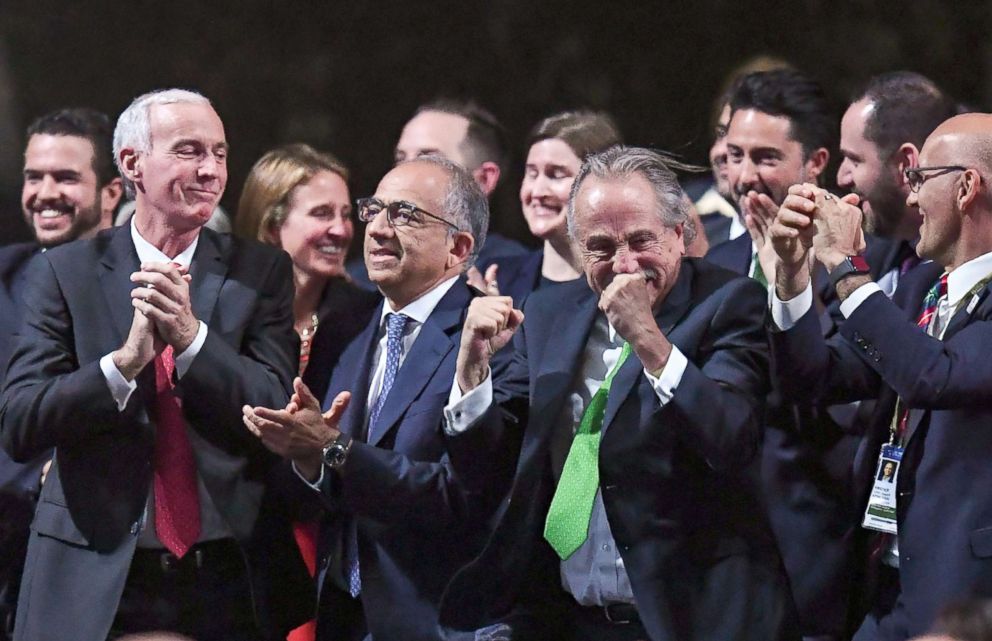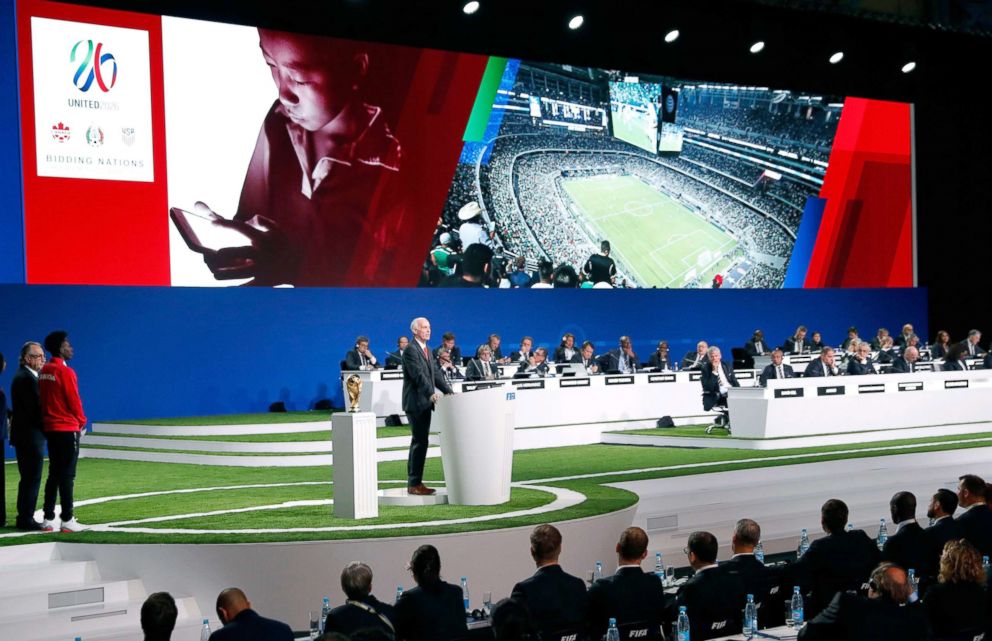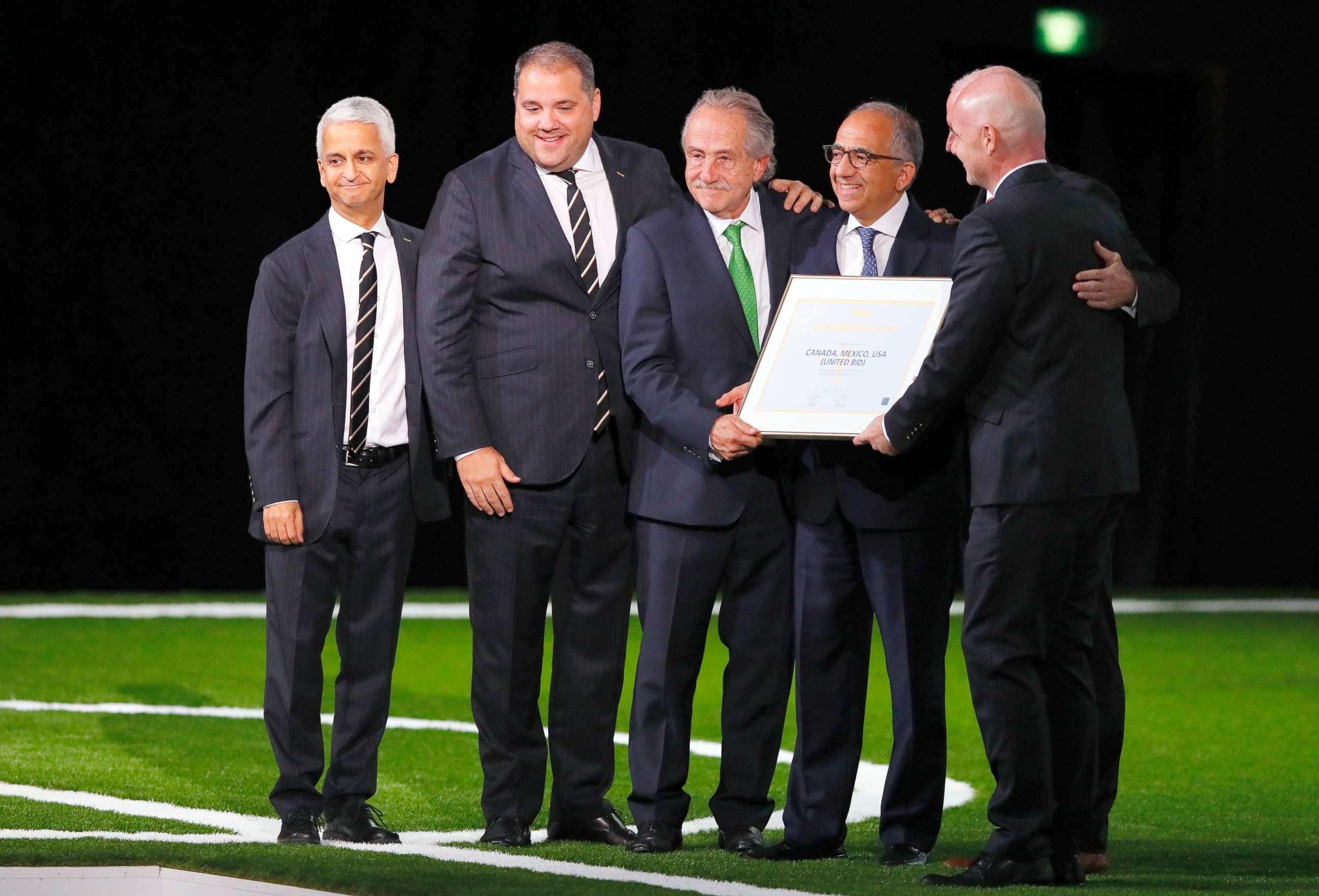US to co-host 2026 soccer World Cup with Canada and Mexico
The joint bid, chosen by FIFA's congress in Moscow, beat out Morocco.
Moscow -- The United States will co-host the soccer World Cup in 2026, after winning a joint bid with Mexico and Canada to hold the sport’s biggest competition.
Delegates from international soccer’s governing body FIFA voted Wednesday at their congress in Moscow to select the joint North American bid, a day before this year’s World Cup kicks off in Russia.
The so-called united bid convincingly beat another put forward by Morocco, receiving 135 of 206 votes against 65 for the North African country.

In an acceptance speech on stage in Moscow, the U.S. Soccer Federation president, Carlos Cordeiro, thanked FIFA for the “incredible honor" and "for entrusting us with this privilege."
The vote means that the World Cup will come to the United States for the first time since 1994, amid growing interest in soccer. The United States will play host to at least 60 games, including the quarterfinals, while Mexico and Canada will take 10 each.
The successful bid also comes as President Donald Trump is engaged in public feuds with the leaders of both those countries. After the vote, Trump Tweeted his congratulations about the win.
“The U.S. together with Mexico and Canada just got the World Cup. Congratulations — a great deal of hard work," Trump wrote.

The North American bid had been the favorite. A FIFA inspection commission in April gave it a considerably higher score in an evaluation report than Morocco, noting the extensive infrastructure already in place in the three countries, compared to Morocco, which would have had to construct or renovate all its stadiums and build large amounts of accommodation and transport.
The FIFA inspectors had deemed Morocco a “high risk” choice, describing the two bids as “almost at opposite ends of the spectrum.”
The 2026 Cup will be the first of an expanded tournament that will include 48 teams instead of 32, putting considerably more burden on the host country. Morocco had said it would need to spend $16 billion on infrastructure for the competition, including on 14 stadiums, whereas only six of North American stadiums need refurbishment.

FIFA’s leadership, under president Gianni Infantino, was also understood to have preferred the North American proposal, swayed in part by its organizers’ claim that their tournament would generate $14.3 billion in profits, versus Morocco’s $7.2 billion.
The vote subsequently went for what was viewed as the safer option, passing over Moroccan arguments that the Cup could serve as an economic and sporting engine for Africa. It follows controversy over the last World Cup vote in 2010, which handed the 2018 and 2022 tournaments to Russia and Qatar, respectively, despite both bids’ being weaker on paper than their rivals.
A U.S. bid at the time failed to win enough votes. After the allegations of corruption, including around that voting, which later roiled FIFA and saw president Sepp Blatter eventually step down, the organization was hoping today’s selection would be less contentious.
The bidding process had, nonetheless, attracted some political controversy around Trump. Before the vote, some had suggested that a “Trump effect” was harming the United States’ chances, saying the president’s quarrels internationally were putting off some countries. In April, Trump endorsed the U.S. bid in a Tweet and threatened countries that did not support it.
"The US has put together a STRONG bid w/ Canada & Mexico for the 2026 World Cup," Trump wrote. "It would be a shame if countries that we always support were to lobby against the US bid. Why should we be supporting these countries when they don't support us (including at the United Nations)?"

Organizers had also worried that the Trump administration’s controversial travel ban targeting some Muslim nations could prevent some teams and fans from visiting during the tournament. But it emerged last week that Trump himself had lobbied FIFA’s leadership to assuage those concerns. The New York Times reported it had seen three letters written by Trump to FIFA president Infantino, promising that his hardline stance on visas would not affect visitors to the World Cup.
The North American bid’s selection means that the United States will now work together with Canada and Mexico to organize the tournament, and puts Trump in the incongruous position of celebrating a collaboration with the leaders of nations his administration has been excoriating as freeloaders. In particular, Trump has been engaged in a high-profile dispute with Canadian President Justin Trudeau over steel and aluminum tariffs, which led to a contentious G7 summit last week.
After the summit, Trump attacked Trudeau as “dishonest” and “weak.” and accused him of making false statements in regard to the tariffs. Trudeau responded by saying that Canadians would "not be pushed around.”
Regardless of the political disputes, the joint proposal envisages the tournament’s coming to 16 cities across the three countries, the largest for any World Cup, with likely three cities each in Mexico and Canada and 10 in the United States.
The proposal includes a huge spread of venues in the United States, from virtually all the major cities on the East and West Coast, to also Atlanta, Nashville, Tennessee, Orlando, Florida, Miami in the Southeast; and then Cincinnati, Ohio, Kansas City, Missouri, Dallas, Houston and Denver in the Midwest and Mountain West.
Not all of the cities included in the bid will be chosen for the final 16, with a refined list to be put forward around 2021, according to the bid's organizers.




